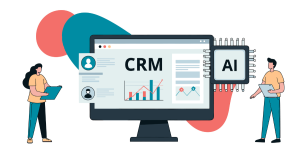Your Customer Relationship Management (CRM) system is the beating heart of your business. With every step of prospect and customer engagement recorded in your CRM, you should never be more than a few clicks away from the intelligence you need to make strategic decisions.
But your CRM is only as good as the information you feed it and the decisions you make about how to use that data. To make the best use of your CRM, you need a carefully defined and precisely executed CRM strategy.
What is a Customer Relationship Management Strategy?
A CRM strategy is a comprehensive plan that includes data collection and management, customer engagement, sales and marketing efforts, customer service, and continuous improvement. It’s a critical component of business operations and can significantly impact an organization’s success and growth.
How Your Business Can Benefit from a Holistic CRM Strategy
The goal of a CRM strategy is to understand your customers and prospects, so that your organization can attract the right prospects, improve customer retention and customer loyalty, and ultimately increase revenue and profitability. To be truly successful, a good CRM should allow multiple team members to access and analyze the data quickly and intuitively.
Here are six key components your CRM strategy should include:
- Customer Data Management: Central to any CRM strategy is customer data collection, storage, and management. This includes contact details, purchase history, preferences, and marketing engagements with your company.
- Customer Segmentation: A CRM strategy involves organizing customers into segments based on various criteria, such as demographics, purchase behavior, or location. This segmentation helps companies tailor their marketing, sales, and service efforts to meet different customer groups’ specific needs and preferences.
- Sales and Marketing Alignment: Effective CRM strategies often involve aligning the efforts of sales and marketing teams. CRM systems can help track leads, nurture prospects, and manage the sales pipeline. This alignment ensures that marketing efforts are more closely aligned with sales goals.
- Customer Service and Support: CRM strategies include processes for handling customer inquiries, complaints, and support requests efficiently and effectively. Providing excellent customer service is critical to building and maintaining strong customer relationships.
- Automation: Automation is an essential element of CRM strategies, allowing users to streamline repetitive tasks, such as data entry, lead nurturing, and follow-up communications.
- Multi-Channel Integration: CRM strategies often involve integrating various communication channels and touchpoints, such as email, social media, website, and mobile apps, providing a richer picture of the customer or prospect.
Getting Started with the Right CRM Tools
A good CRM strategy starts with selecting the right CRM system for your business. There are many different CRM tools available, all with various functionalities and price points. The choice can be a little overwhelming if you are just getting started.
When you are looking for a CRM system, here are just a few things that you’ll need to consider:
- Ease of Use: A user-friendly interface is essential to encourage adoption among your team. Look for an intuitive CRM tool that doesn’t require extensive training for your colleagues to get started. Remember, if your colleagues don’t use the CRM system as they should, your entire strategy will fail.
- Customer Support and Training: Assess the level of customer support and training options the CRM provider offers. Consider whether they provide resources like documentation, tutorials, and responsive customer support to help you troubleshoot issues and maximize your CRM’s effectiveness.
- Integration Capabilities: Ensure that the CRM tool seamlessly integrates with your broader Martech stack, including email, marketing automation, e-commerce, and accounting tools. This integration should enable you to centralize and streamline data across your organization.
- Scalability: Choose a CRM solution that can grow with your business. As your customer base and data volume increase, your CRM should be able to handle the additional load without significant disruptions or the need for a complete system overhaul.
- Cost and ROI: Evaluate the total cost of your CRM, including subscription fees, setup costs, and any additional costs for training, support, customization, or integrations. When looking at prices, you should also consider the potential return on investment (ROI) in terms of increased sales, improved customer relationships, and efficiency gains.
Steps to Developing a Personalized Customer Relationship Strategy
Developing a personalized CRM strategy is an ongoing process that requires dedication, data-driven decision making, and a commitment to delivering exceptional customer experiences.
- Set Your Objectives: Start by clarifying your specific objectives for CRM strategy. What do you want to achieve? This may include improving customer retention, increasing upsell and cross-sell opportunities, or enhancing the overall customer experience.
- Segment Your Customer Base: Identify different customer segments based on demographics, behaviors, preferences, and needs. These segments will serve as the foundation for personalization efforts.
- Create Detailed Customer Personas: Develop detailed customer personas for each segment, including information such as demographics, buying behavior, preferred communication channels, and any unique preferences or challenges.
- Develop Your Personalization Strategies: Develop the specific personalization strategies you will implement. This can include personalized product recommendations, tailored content, targeted email marketing, and customized offers.
- Automate Your Personalization Strategies: Utilize automation tools within your CRM system to deliver real-time personalized messages and recommendations. Automation ensures consistency and efficiency in personalization efforts.
- Monitor and Measure Your Results: Regularly monitor key performance indicators (KPIs) related to your CRM personalization strategy. Track metrics like conversion rates, customer satisfaction scores, and customer retention rates to assess the impact of your activities.
- A/B Testing and Optimization: Continuously test and refine your personalization efforts. Use A/B testing to compare the performance of personalized content or offers against non-personalized versions. Analyze the results and make adjustments accordingly.
- Train Your Team: Ignore this step at your peril. Ensure your team is trained in using the CRM system and effectively implementing personalization strategies. A considered approach to training will encourage a customer-centric culture within your organization.
So, how quickly should you see a positive impact from your CRM strategy?
This will depend entirely on your business, customer base, and how proactive your campaign is. You may see immediate results, or trends could take a while to emerge. Like many other marketing strategies, an ongoing commitment to best practices and maintaining momentum are usually rewarded in the long term.
How Can emfluence Help?
The marketing experts at emfluence are ready to show you how our marketing automation platform, combined with leading CRM solutions, can optimize every stage of the customer journey, ensuring every engagement is delivered with pinpoint accuracy. But we are not just a technology company. By combining our technology with the insight of our agency team, we have the experience to show marketers how to implement effective CRM strategies across numerous business verticals. To learn more about how emfluence can help you build a more efficient, effective, and profitable CRM strategy, contact us today at expert@emfluence.com.


